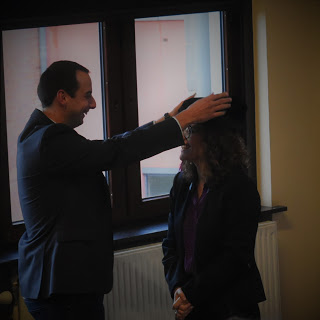PhD Defenses around the world: a defense in Bioinformatics in Belgium
 Today, I have the pleasure of hosting Paola Masuzzo to discuss her PhD Defense at the Ghent University. Paola is currently a postdoctoral fellow at Ghent University and at the VIB-UGent Center for Medical Biotechnology, both in Ghent, Belgium. After a Master degree in Biomedical Engineering, she started a PhD in bioinformatics, researching tools and algorithms to better understand cell migration. Paola is currently working on MULTIMOT, an exciting inter-disciplinary EU-H2020 project, and will soon try to define what the next step in her academic (or not) life will be.
Today, I have the pleasure of hosting Paola Masuzzo to discuss her PhD Defense at the Ghent University. Paola is currently a postdoctoral fellow at Ghent University and at the VIB-UGent Center for Medical Biotechnology, both in Ghent, Belgium. After a Master degree in Biomedical Engineering, she started a PhD in bioinformatics, researching tools and algorithms to better understand cell migration. Paola is currently working on MULTIMOT, an exciting inter-disciplinary EU-H2020 project, and will soon try to define what the next step in her academic (or not) life will be.
In her free time, Paola enjoys Yoga, food, and travelling. She is an Open Science fan and an advocate for Open Access. You can follow her on Twitter.
A typical PhD in Belgium takes the form of a 4 year research, which is then concluded with a written dissertation. This dissertation, mostly referred to as a PhD thesis, takes the form of a book, and the candidate can choose either to re-write or re-elaborate the entire research conducted, or to simply compile the peer-reviewed articles they have published in the course of the PhD.
Another aspect to keep in mind when graduating at Ghent University is that there are two distinct certificates one can aim to obtain: the certificate of successful PhD (as in most universities), and the certificate of the Doctoral Training Programme. To obtain the latter, candidates are required to complete a minimum set of activities, which consists of three specialist courses, three transferable skills seminars, three conference contributions, one publication, annual progress reports and finally the doctoral defence. This is quite a bit of extra work, but it is meant to contribute to the personal and professional growth of the candidates. I have personally obtained both certificates, and this is actually the standard procedure across candidates in my research group.
So, what happens once you think you are ready for the final stage? You start writing your thesis. I started well before the submission deadline I had in mind, and yet, it was a hell of a job! Summing up all the efforts, discoveries and objectives of four years is not easy at all. Plus, you need to make sure a proper introduction to the research problem is given, and a deep discussion on future perspective and possibilities. All in all, a very tiring time! However, the most difficult part begins afterwards: paperwork! The amount of paperwork I needed to go through was unbelievable. One deadline after the other, and all with the fear of doing something wrong or forgetting some piece of information here and there! One of the most challenging tasks was the selection of jury members. At Ghent University, once the candidate is ready for the defense, an examination committee needs to be established, usually along the supervisor’s suggestions. Once again, quite some strict criteria on the composition of this committee makes the process quite complicated! This committee receives your dissertation, and will (in most of the cases) suggest you to change a few things here and there to make the thesis (even) better.
So, suppose all went well, you did re-work on your thesis, you have your book ready: what’s next? That’s when the real fun begins: the closed defense! This is only Part I of the entire PhD defense process. You and your examination committee gather together in a room, without the presence of your supervisor(s) or any other person. Here, after a 5 min introduction to your thesis, the committee asks you all sorts of questions, in order to judge the quality of your research and your own quality, as a PhD candidate. I cannot say that I was not nervous when this time came for me. Moreover, the multidisciplinary nature of my thesis presented one more challenge: my committee was a mix of experts in very diverse disciplines, from cell biology over microscopy imaging to engineering. I was pretty much scared to death! But just after ten minutes, I actually started to have a lot of fun. I truly enjoyed the discussion, which was more than a ‘Q&A’ section: it was merely an interactive and profound conversation from peers to peer. All in all, an extremely satisfying way to officially enter the PhD world!
If part I goes well, part II of the PhD defense can take place: the public defense. This is where the show happens! You invite over your family, your friends, your colleagues, and your supervisors this time get to see you defending. You again present your work, but this time in a more detailed way (normally around 40-45 min), and then the committee asks you a whole bunch of questions, but this time with a broader view/scope. The general public can ask questions too! As a matter of fact, I did receive a question from the audience, specifically from my boyfriend!
When the questions are over, the committee leaves for a few moments, and if everything is OK, they then come back for the final proclamation. This is the nicest moment, the moment when you realized: yes, I did it! This is when your supervisor gets to put the Doc Universtity hat on your head. A memory I will certainly treasure for the rest of my life!
